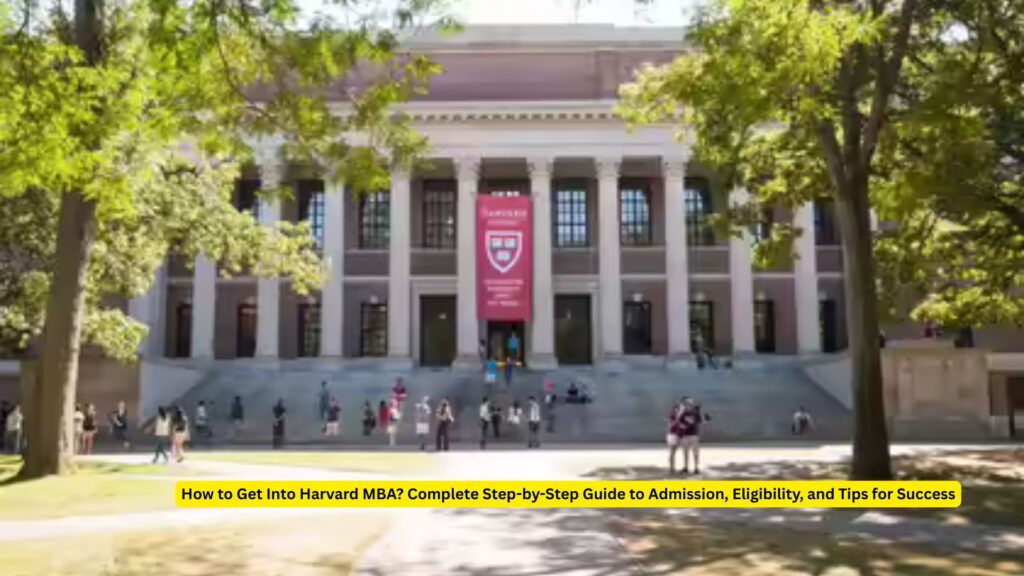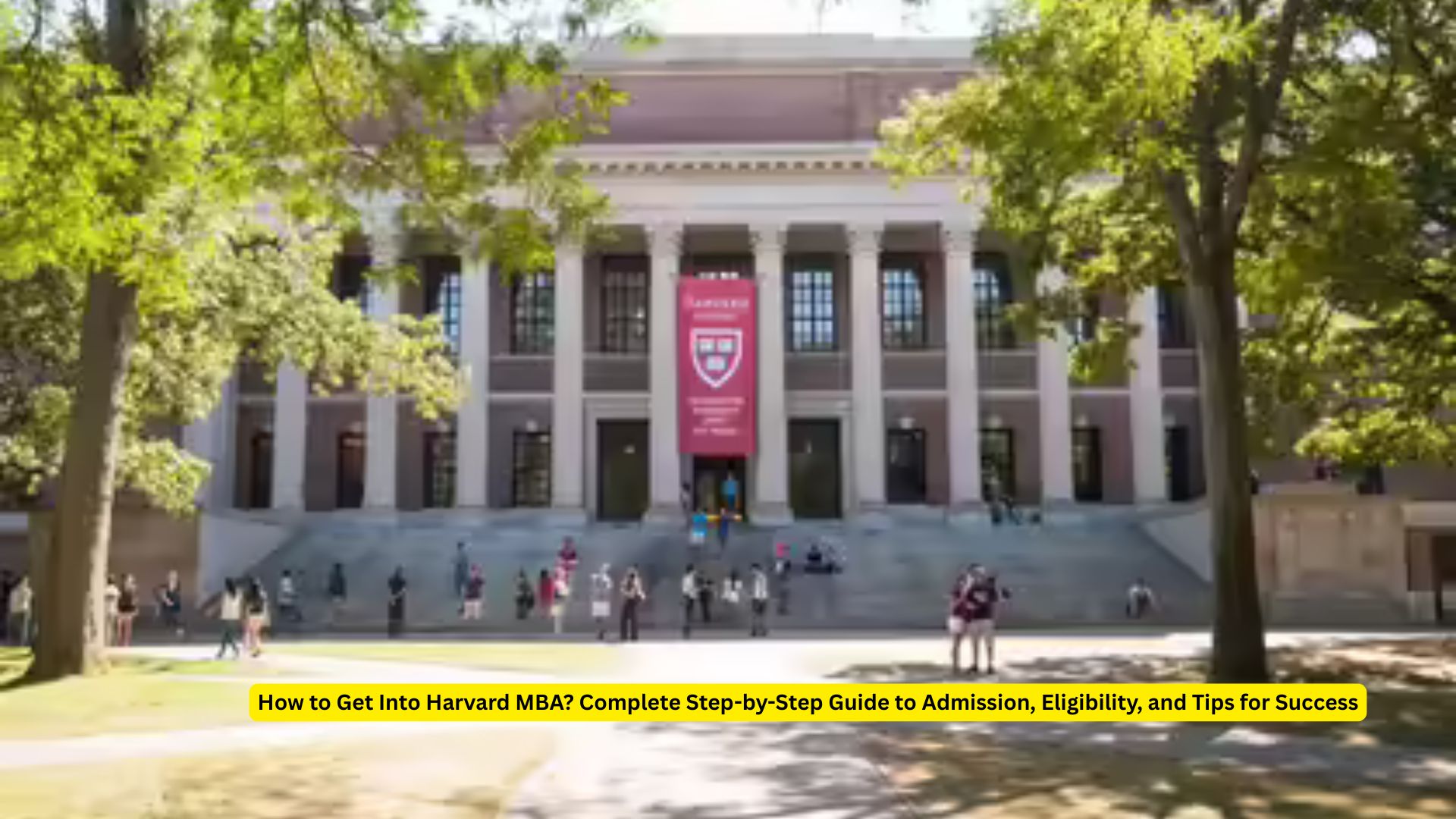How to Get Into Harvard MBA? Earning an MBA from Harvard Business School (HBS) is one of the most prestigious achievements in the academic and business world. Harvard’s MBA program consistently ranks among the top in the world, attracting ambitious professionals who want to become global leaders, entrepreneurs, and innovators.
However, the question most aspiring candidates ask is: “How do I get into the Harvard MBA program?”
Admission into Harvard Business School (HBS) is incredibly competitive. With thousands of applicants from over 100 countries every year and an acceptance rate of around 10%, securing a seat requires much more than just strong grades or work experience. Harvard looks for exceptional individuals who demonstrate leadership potential, academic excellence, personal integrity, and a vision for impact.

This comprehensive guide explains everything you need to know about getting into the Harvard MBA program — from eligibility requirements and application components to insider tips, essay strategies, and financial aid opportunities.
Overview of the Harvard MBA Program
The Harvard Business School MBA is a two-year, full-time residential program located in Boston, Massachusetts. It focuses on real-world leadership, decision-making, and management skills through the Case Study Method, a hallmark of HBS learning.
Key Highlights of the Program
- Duration: 2 years (Full-time)
- Degree Awarded: Master of Business Administration (MBA)
- Location: Boston, Massachusetts, USA
- Teaching Method: Case Study Method
- Class Size: ~930 students per cohort
- Average Age: 27 years
- Average Work Experience: 4–5 years
- Acceptance Rate: Approximately 10%
- Application Rounds: Round 1 (September), Round 2 (January)
The HBS MBA program is designed to develop leaders who make a difference in the world — people who combine analytical thinking, emotional intelligence, and ethical judgment.
Eligibility Requirements for Harvard MBA
Before you begin the application, it’s essential to ensure that you meet Harvard’s eligibility requirements.
| Requirement | Details |
|---|---|
| Educational Qualification | A recognized undergraduate (bachelor’s) degree or equivalent. There is no minimum GPA requirement. |
| Work Experience | Typically 2–10 years. HBS does not require a specific number of years but values quality and leadership potential in experience. |
| GMAT/GRE Score | A valid GMAT or GRE score is mandatory. There is no minimum cutoff, but competitive applicants usually have GMAT scores between 720–760. |
| English Proficiency | TOEFL, IELTS, or PTE is required for non-native English speakers. |
| Leadership Qualities | Evidence of initiative, responsibility, teamwork, and impact in professional or community settings. |
| Personal Integrity and Character | Harvard places strong emphasis on authenticity, humility, and ethical judgment. |
In short, Harvard is not only looking for academic stars but for individuals who have demonstrated leadership, resilience, and purpose.
Application Components: Step-by-Step
Getting into Harvard MBA requires careful preparation and a complete understanding of each application component.
Step 1: Online Application Form
Applicants must submit the online application form via the Harvard Business School portal. It includes personal information, academic background, and professional history.
Step 2: Transcripts
You must submit transcripts from all undergraduate and graduate institutions attended. Academic excellence is a key factor, but Harvard also looks for upward growth trends and rigor of coursework.
Step 3: GMAT or GRE Scores
Both the GMAT and GRE are accepted. Applicants are encouraged to choose the test that best reflects their abilities. Competitive scores are usually:
- GMAT: 720–760 (median ~730)
- GRE: 325+ (combined score)
However, Harvard emphasizes that test scores alone do not determine admission.
Step 4: Resume
Your professional resume should reflect:
- Career progression
- Leadership roles and accomplishments
- Quantifiable achievements
- Extracurricular involvement and community service
It’s recommended to keep the resume to one page, focusing on quality over quantity.
Step 5: Essay
Harvard requires only one essay, making it the most important narrative component of your application.
Essay Prompt (as typically used):
“As we review your application, what more would you like us to know as we consider your candidacy for the Harvard Business School MBA program?”
There is no word limit, but most successful essays range from 800–1,200 words.
Tips for Writing the Harvard MBA Essay:
- Be authentic — tell your real story.
- Focus on why you made decisions, not just what you did.
- Highlight your leadership and growth moments.
- Explain why Harvard MBA is the next logical step in your journey.
- Avoid clichés and generic career goals.
Step 6: Recommendation Letters
Harvard requires two recommendations from professional supervisors or mentors who can provide specific insights into your leadership potential and work ethic.
Each recommender answers specific questions about:
- Your impact in the organization
- Leadership qualities
- Analytical and interpersonal skills
Step 7: Interview (By Invitation Only)
After an initial review, selected applicants are invited to interview.
The Harvard MBA interview is a 30-minute, structured discussion conducted by members of the HBS Admissions Board.
Interview Focus Areas:
- Career goals and motivation
- Leadership examples
- Decision-making ability
- Fit with Harvard’s values and teaching method
Applicants are required to submit a post-interview reflection within 24 hours, summarizing their thoughts and learnings.
Step 8: Application Fee
The application fee is $250 USD, payable at the time of submission. Fee waivers are available for applicants with demonstrated financial need.
Harvard MBA Admission Timeline
| Application Round | Application Deadline | Interview Notifications | Decision Released |
|---|---|---|---|
| Round 1 | Early September | Late October | Early December |
| Round 2 | Early January | Mid-March | End of March |
| 2+2 Program (Deferred Admission) | Late April | June | July |
It’s advisable to apply in Round 1 or Round 2, as Round 3 is extremely competitive and has limited spots.
Tuition Fees and Financial Aid
The Harvard MBA is a significant investment, but HBS ensures that finances are not a barrier for qualified students.
| Expense Category | Annual Cost (USD) | Approx. Per Semester |
|---|---|---|
| Tuition | $76,000 | $38,000 |
| Program Fees | $2,600 | $1,300 |
| Health Insurance | $4,000 | $2,000 |
| Housing and Meals | $24,000 | $12,000 |
| Books and Materials | $1,500 | $750 |
| Personal Expenses | $5,000 | $2,500 |
| Total Estimated Cost | $113,100 per year | $56,550 per semester |
Financial Aid and Scholarships
- Harvard offers need-based fellowships, not merit-based.
- Average fellowship aid: $45,000 per year.
- Over 50% of students receive some form of financial aid.
- International students are fully eligible for financial support.
Popular HBS scholarships include:
- HBS Fellowship Program
- Forward Fellowship (for low-income students)
- External Fellowships (Fulbright, Forté, etc.)
What Harvard Looks For in Candidates?
Harvard Business School defines an ideal candidate through three core attributes:
- Habit of Leadership
- Examples of leading people, projects, or initiatives.
- Proven record of impact, not just titles.
- Analytical Aptitude and Appetite
- Ability to think critically and solve complex problems.
- Strong academic or quantitative background.
- Engaged Community Citizenship
- Commitment to teamwork, collaboration, and positive influence.
Successful applicants demonstrate not perfection, but potential — the potential to grow, lead, and make a meaningful difference.
Strategies to Strengthen Your Harvard MBA Application
a. Start Early
Begin your preparation 12–18 months before applying. It allows time for GMAT preparation, essay brainstorming, and resume polishing.
b. Focus on Leadership Stories
HBS values action-oriented individuals. Highlight stories where you took initiative, led change, or made a measurable difference.
c. Quantify Achievements
Where possible, use metrics to describe your impact:
- “Increased sales by 20%”
- “Led a 10-member cross-functional team”
- “Launched a new product generating $1M in revenue”
d. Build a Personal Narrative
Admissions officers remember compelling stories, not just achievements. Connect your experiences into a cohesive life and career narrative.
e. Research the Program Deeply
Demonstrate a genuine understanding of Harvard’s Case Study Method, FIELD program, and culture of collaboration.
f. Prepare Intensively for the Interview
Harvard interviews are analytical and conversation-based. Be prepared to discuss your resume in detail, justify your decisions, and reflect on your growth.
Alternatives: The 2+2 Deferred MBA Program
The HBS 2+2 Program allows undergraduate students to secure deferred admission into the MBA program. After being accepted, they work for two years (or more) before joining HBS full-time.
Ideal Candidates:
- Final-year college students
- Individuals planning nontraditional career paths (STEM, public service, startups)
This program is perfect for early-career aspirants who want to plan their future at HBS in advance.
Life After Harvard MBA
Harvard MBA graduates enjoy global recognition and powerful career outcomes.
Career Statistics:
- Average Base Salary: $175,000
- Average Signing Bonus: $30,000
- Top Employers: McKinsey, BCG, Bain, Goldman Sachs, Amazon, Google
- Industries: Consulting (26%), Finance (17%), Tech (19%), Entrepreneurship (11%)
Graduates become CEOs, founders, policymakers, and thought leaders, continuing Harvard’s legacy of producing change-makers.
Important Links and Information
| Category | Details / Links |
|---|---|
| Program Name | Harvard Business School MBA |
| Duration | 2 Years (Full-Time) |
| Location | Boston, Massachusetts, USA |
| Application Rounds | September (Round 1), January (Round 2) |
| Average GMAT Score | 730 |
| Average Work Experience | 4–5 years |
| Tuition (Per Year) | $76,000 |
| Financial Aid | Need-Based Fellowships |
| Application Fee | $250 |
| Official Website | https://www.hbs.edu/mba |
| Financial Aid Information | https://www.hbs.edu/mba/financial-aid |
| HBS 2+2 Program | https://www.hbs.edu/mba/admissions/2×2-program |
FAQ about How to Get Into Harvard MBA?
What GPA do I need to get into Harvard MBA?
There is no minimum GPA requirement, but most admitted students have GPAs between 3.6 and 3.9 on a 4.0 scale.
What GMAT score is required for Harvard Business School?
Competitive applicants typically score between 720 and 760 on the GMAT.
Does Harvard prefer GMAT or GRE?
Harvard accepts both equally. Choose the one that best represents your strengths.
Can international students apply for financial aid?
Yes. Financial aid at HBS is need-based and equally available to international students.
How much work experience is required?
Most successful applicants have 4–5 years of work experience, though exceptional candidates with less experience may also be admitted.
What is the Harvard MBA acceptance rate?
The acceptance rate hovers around 10%, making it one of the most selective programs globally.
Can I get into Harvard MBA without work experience?
It’s uncommon, but possible through the HBS 2+2 Program for undergraduate students applying for deferred admission.
How important is the essay in the application?
The essay is a critical part of your application — it’s your chance to show your personality, values, and motivations beyond test scores.
Is the interview mandatory for all applicants?
No. Interviews are conducted by invitation only after initial application review.
When should I start preparing for Harvard MBA?
Start at least 12–18 months in advance to prepare for exams, refine your resume, and craft compelling essays.
Conclusion
Getting into the Harvard MBA program is a challenging but achievable goal for those who prepare strategically, communicate authentically, and demonstrate leadership potential. Harvard seeks individuals who are not only academically capable but also deeply motivated to make a difference in the world.
Success in the application process comes from self-awareness, storytelling, and clear purpose. Whether you are a seasoned professional, an entrepreneur, or a young visionary, Harvard values impact over perfection — your ability to learn, lead, and transform communities.
Ultimately, the journey to Harvard MBA is not merely about earning a degree — it’s about embracing a lifelong mission of leadership, innovation, and service. If you prepare with clarity, authenticity, and determination, you stand a real chance of joining the global community of Harvard Business School leaders who continue to shape the future of business and society.

